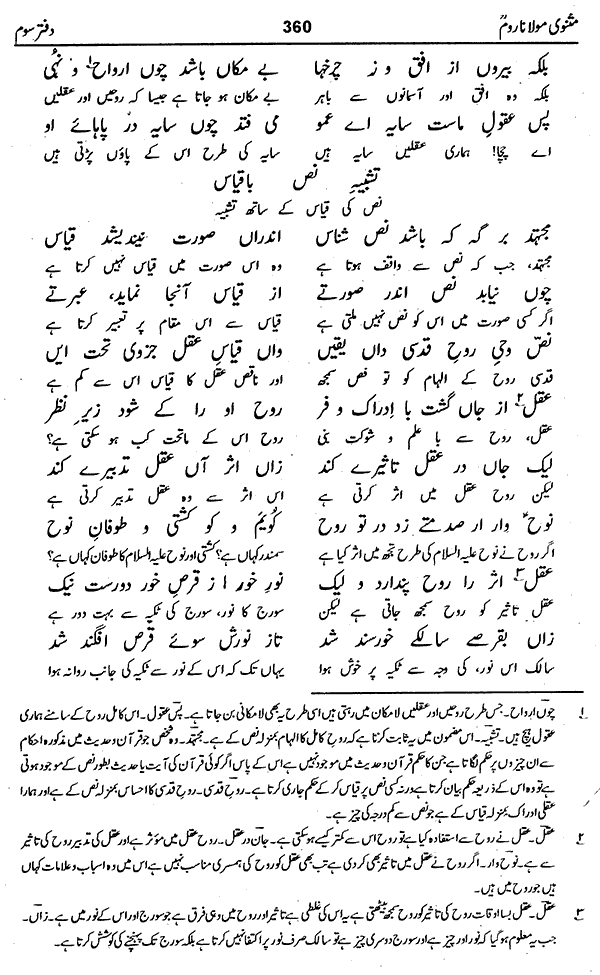The (Divine) wisdom in ruining the body by death.
I was a beggar in this dungeon-like house; (now) I have become a king: a palace is needed for a king.”
Truly, palaces are the place for (spiritual) kings to take their pleasure in; for him that is
(spiritually) dead a grave is a sufficient house and dwelling.
To the prophets this world seemed narrow: like kings, they went into (the world of)
spacelessness.
To the (spiritually) dead this world appears splendid: its external (aspect) is large, but in reality it is narrow.
(more) doubled (bowed with affliction) the more he lived in it?
When during the time of sleep the spirit is freed (from this world), behold how it rejoices in that place (to which it goes)!
The wicked man is (then) delivered from the wickedness of his nature, the prisoner escapes from
thoughts of confinement.
This very wide earth and heaven becomes exceedingly narrow at the time of lying down (to sleep).
It (the world) is an eye-bandage (a spell that blinds the eye): (it is) wide (in appearance), and (in reality) mighty narrow: its laughter is weeping, its glory is entirely shame.
Comparison of this world, which is wide in appearance and narrow in reality, (to a bathroom), and comparison (of the next world) to sleep, which is the (means of) release from this narrowness.
Although the bath-room is broad and long, your soul is distressed and fatigued by the heat.
Your heart does not expand (you feel no relief) till you come out: what advantage, then, is the spaciousness of the room to you?
Or (it is) as though you should put on tight shoes, O misguided one, and go into a wide desert. The spaciousness of the desert becomes narrow (distressing); that desert and plain becomes a
prison to you.
He does not know that you, like the wicked, are outwardly in the rose-garden, (while) your soul is in lamentation.
Your sleep is to put those shoes off, for (then) your soul is free from the body for a while.
To the saints, O reader, sleep is a kingdom, as (it was to) the Men of the Cave in this world. They (sleep and) dream, and no (physical) sleep is there; they go into nonexistence, and no (material) door (is there).
I am cramped like the embryo in the womb: I have become nine months old: this migration has become urgent.
Unless the throes of childbirth overtake my mother, (what should I do?): in this prison I am amidst the fire.
My mother, namely, my nature (natural body), in consequence of its death-throes, is giving birth
(to the spirit), to the end that the lamb (the spirit) may be released from the ewe,
So that the lamb may graze in the green fields. Come, open your womb, for this lamb has grown big.”
The pregnant woman weeps at childbirth, saying, “Where is the refuge?”—but the embryo
laughs, saying, “Deliverance has appeared.”
Whatever mothers (bodies) there are under the sky—mineral, animal, or vegetable—
They are heedless, every one, of another's pain, except those persons that are discerning and perfect.
How should the man with a bushy beard know of his own house that which the man with a few hairs on his chin knows of (other) people's houses?
Setting forth that whatever is (denoted by the terms) heedlessness and anxiety and indolence and darkness is all (derived) from the body, which belongs to the earth and the lower world.
Heedlessness was (derived) from the body: when the body has become spirit, it inevitably beholds the mysteries (of the Unseen).
When the earth is removed from the celestial atmosphere, there is neither night nor shade nor sunset.
Wherever shade and night or shadowy place exist, it is (caused) by the earth, not by the heavens and the moon.
Likewise, it is from the faggots that the smoke always arises, not from the resplendent fires.
Every state of heaviness (sloth) and indolence, indeed, is (derived) from the body; the spirit, from its lightness (subtlety), is all on the wing.
The face is red from the predominance of blood; the face is yellow from the movement (action)
of the yellow bile.
The face is white from the power of the phlegm; it is from the black bile that the face is swarthy. In reality He (God) is the creator of effects, but followers of the husk (formalists) see nothing but the (secondary) cause.
from doctor and disease;
(But) when a son of man is born twice, he plants his foot upon the head of (all) causes:
The First Cause is not his religion; the particular (secondary) cause has no enmity against him
(does him no harm).
He flies, like the sun, in the (spiritual) horizon with the bride, sincerity; and (material) form (is)
as a veil (for him).
Nay, beyond horizons and skies he is without locality, like spirits and intelligences.
Whenever the mujtahid (legist) knows a Statute, in that case he will not think of (employing)
analogy;
(But) in a case where he does not find a Statute, there he will produce an example from analogy.






No comments:
Post a Comment